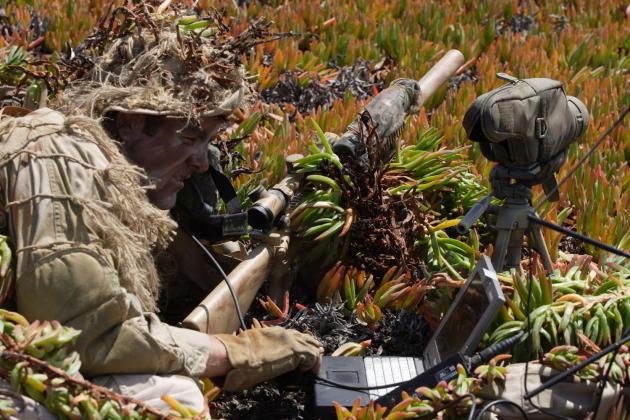The cold morning air hung thick in the Afghan valley. Each warm exhale of breath would briefly fog the outside corner of my riflescope as I waited and maintained a clear view of my target. I could make out a middle-aged man, in traditional Afghan dress, with a crook in his step, perhaps a wound and story from another conflict. Intense training in the elite US Navy SEAL Sniper course had taught me to be patient, wait for a perfect shot, control my breathing and then execute.
At that moment in time I reflected internally, I alone held this man’s life in my hands. Firing long range it is critical to account for all environmental and ballistic factors, wind, temperature, barometric pressure, degree of latitude, bullet velocity and the deviation caused by the earth’s rotation (known as “the Coriolis effect”).
Every detail of this shot had been programmed into my handheld computer, which then gave me a firing solution. My scope was adjusted and in sync with my environment. With a one centimeter movement of my right index finger, I was about to deliver this man’s death. I would come to learn that every kill would be burned into memory like frames in a movie. Breathe, focus, squeeze. As I stared at his lifeless body, steam was slowly rising from the bullet hole in his chest. The shot was more than a kilometer away; he was gone without ever hearing the report of the rifle.
As a former Navy SEAL Sniper, sniper instructor and eventually course manager (head master) of the secretive US Navy SEAL sniper course, I am intimately familiar with the patience and skill required to simultaneously execute the three pirates who held a US shipping captain hostage off the coast of Somalia. It took the SEAL sniper team less than 10 hours to deploy, get half way around the world and complete their mission, start to finish. Another day at the office…
The 21st Century Sniper is a mature, intelligent shooter who leverages technology to his deadly advantage. He has spent thousands of hours honing his skills. He is a master of concealment in all environments, from the mountains of Afghanistan to the crowded streets of Iraq. He is trained in science and left alone to create the unique art of the kill. To the sniper, the battlefield is like a painter’s blank canvas. It is his job to simultaneously utilise tools, training and creativity to deliver devastating psychological impact upon the battlefield. And it is he alone that is left with the intimacy of the kill.
What does it take to make a Navy SEAL sniper? The SEAL course is arguably best in class. It is the most challenging and technically advanced course in the world. Just looking at the accomplishments of the course graduates is justification enough. Few people outside of US Special Operations Command (SOCOM) know this of course. What you will not read about on Wikipedia or anywhere else, is that the Navy SEALs currently have the most accomplished sniper in SOCOM, with over one hundred confirmed kills to his credit.
We seek out a special breed of man; a man who is willing to crawl over the hot desert floor for hours, as slow as a snail, through his own bodily waste to set up on his target. A man who will then wait hours and more for that perfect shot. A man with the will and patience of a sniper.
The US Navy SEAL course is divided into three phases over 90 days, and tests to the highest standards in the world.
In the first phase, the candidate learns the latest in digital photography techniques, computer image manipulation/compression and satellite radio communications. Historically the sniper would sketch a target in detail and record notes with pencil and paper. In the 21st century the sniper leverages technology to his advantage, he uses the most advanced digital SLR camera systems, small handheld computers, and the most advanced ballistic software in the world to record target information and produce an accurate firing solution.
Phase two is the Scout portion of training. The name of the game is stealth and concealment. In this phase the sniper learns the art of camouflage, small unit tactics, patrolling techniques and most importantly how to get in and get out of hostile enemy area undetected, without leaving behind the slightest sign he was there. We often fail candidates who leave behind the slightest trace; a bullet casing left behind will get you sent home.
Towards the end of this phase we introduce advanced marksmanship fundamentals and a system of mental management utilized by the top athletes in the world. Mental management gives the students the tools (whether or not they use them is up to them) to cope with adversity and also a system to rehearse and practice their skills perfectly through mental visualization techniques. See more in part two….


Leave a Reply
You must be logged in to post a comment.